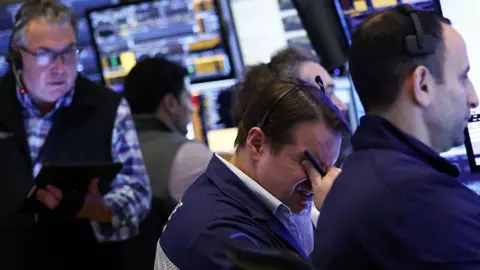Cost of living correspondent
 Getty Images
Getty ImagesThe sweeping new tariffs announced by President Donald Trump have triggered ructions across financial markets, with global share prices seeing hefty falls.
It’s the latest example of big shifts in stock markets making the news, whether they are booms or falls.
As companies grow, they issue shares. The largest companies in the UK have shares which are bought and sold on the London Stock Exchange.
Their collective performance is often quoted amid a blizzard of numbers that may feel confusing and irrelevant. Rarely does anyone mention the FTSE 100 during a coffee with friends.
But there are good reasons why this performance affects your life and finances.
‘I don’t invest’ – actually, you probably do
Many people’s initial reaction to “the markets” is that they are not directly affected, because they do not invest money.
Yet there are millions of people with a pension – either private or through work – who will see their savings (in what is known as a defined contribution pension) invested by pension schemes. The value of their savings pot is influenced by the performance of these investments.
Pension savers mostly let experts choose where to invest this money to help it grow. Widespread falls in share prices are likely to be bad news for pension savers.
Hundreds of billions of pounds are held in defined contribution pensions at the moment.
So big rises or falls can affect your pension, but the advice is to remember that pension savings, like any investments, are usually a long-term bet.
Experts say that investors have always had to ride economic shocks. Investments, by definition, require a long-term outlook and strategy. So, they are urging people not to panic in such circumstances or make knee-jerk decisions.
Does everyone have a pension like this?
No, some people have a pension which promises a specific value, depending on their salary. Others have no pension at all.
Millions of people have been automatically enrolled into a pension and may have not really noticed.
This scheme sees employers divert wages into a pension and contribute some money themselves. The government adds a little in tax relief.
In every case, the value of these pension savings is affected by investment performance. So “the markets” matter – maybe not as much as everyday wages, but for future pensions.
What about people retiring or retired?
Timing is more critical for those at retirement age, as this may be when a retiree uses their pension pot to buy a retirement income, or annuity. The bigger the pot, the more income they will get in retirement.
As you approach retirement age, pension pots tend to be moved to less risky investments, such as government bonds. When stock markets fall, these bonds can do better.
Anyone who has a pension pot invested and is taking an income from it will again see their investment go up and down with the stock markets.
That could mean getting less than you expected if you cash in too much after stock markets have fallen, making it important to plan how to make up any of this shortfall, experts say.
If I’m still in work, can my job be affected?
Jobs may be affected by companies’ responses to tariffs, for example.
However, specifically with share prices, trouble over an extended period could have an effect on the amount of work available.
There is a huge element of the unknown here, and plenty of other factors are in play when businesses make decisions on investment and employment.
Do changes affect my mortgage?
There is no direct link between the stock market and your mortgage or rent.
Instead, all eyes will be on the Bank of England for its views on interest rates.
Cutting them would make some kinds of mortgages cheaper, although cash savers would probably get a lower return on cash savings.
Conversely, an increase would make borrowing more expensive, but bring better returns for savers.
Are stock market falls always bad?
In purely investment terms, lower share prices can offer an opportunity to buy, in the hope that over the long term, they recover and rise. Many people will do this initially through a stocks and shares Individual Savings Account (Isa).
Experts and regulators are at pains to point out that investments can go down as well as up, and urge people not to put everything into one investment, but to diversify.
Some people invest money in what are known as tracker funds. These go up and down in line with the performance of a certain index, such as the FTSE 100.
So if the index falls, so does the value of their investments and vice versa. One advantage of these funds is that they often cost relatively little to sign up to.






























